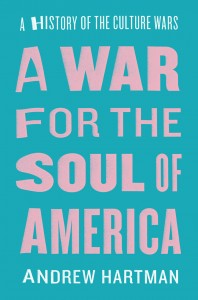 I conclude my book, A War for the Soul of America: A History of the Culture Wars, with the purposefully provocative argument that the culture wars are dead, or at least, that the culture wars that helped define the 1980s and 90s are history. The culture wars were a response to the transformations of the sixties. The culture wars compelled Americans, even conservatives, to acknowledge these transformations. And although acknowledgment often came in the form of rejection, it was also the first step to resignation, if not outright acceptance.
I conclude my book, A War for the Soul of America: A History of the Culture Wars, with the purposefully provocative argument that the culture wars are dead, or at least, that the culture wars that helped define the 1980s and 90s are history. The culture wars were a response to the transformations of the sixties. The culture wars compelled Americans, even conservatives, to acknowledge these transformations. And although acknowledgment often came in the form of rejection, it was also the first step to resignation, if not outright acceptance.
The metaphor has run its course. Cultural conflict persists, but it does so in a different register, shaped by a different logic. In short, we need new words. The old debates are exhausted.
You’re laughing, aren’t you.
My hunch is that many of my reviewers, especially if I’m lucky enough to get reviewed in the non-academic press, will focus on my provocative conclusion, and will point to this or that current event that demonstrates the persistence of the culture wars. No amount of disclaiming—“I’m a historian! I don’t get paid to predict the future! And what about the other 300+ pages?”—will change this.
 Indeed, recent events signal the continuation of the culture wars, vintage 1988 or 1991. The national debate over Clint Eastwood’s American Sniper is playing out much like a photographic negative of the controversy that engulfed Martin Scorsese’s The Last Temptation of Christ. Everyone has an opinion about American Sniper, no doubt including those who have yet to see it, much as Focus on the Family founder James Dobson, after admitting he had not seen The Last Temptation, told his massive radio audience that it “would appear to be the most blasphemous, evil attack on the church and the cause of Christ in the history of entertainment.” The actual content of the film is far less important than what it stands for in the larger political culture. Should we question the nation’s wars in the Middle East? Are you for the troops or against them? Is Chris Kyle an American hero or an American psycho? Do good Americans have to like this film? The main difference between the 1988 debate about The Last Temptation and our current dispute over American Sniper might be that whereas the former was about religion and sex, the latter is about war and the American role in the Middle East. Perhaps this difference signifies a new culture wars frontier.
Indeed, recent events signal the continuation of the culture wars, vintage 1988 or 1991. The national debate over Clint Eastwood’s American Sniper is playing out much like a photographic negative of the controversy that engulfed Martin Scorsese’s The Last Temptation of Christ. Everyone has an opinion about American Sniper, no doubt including those who have yet to see it, much as Focus on the Family founder James Dobson, after admitting he had not seen The Last Temptation, told his massive radio audience that it “would appear to be the most blasphemous, evil attack on the church and the cause of Christ in the history of entertainment.” The actual content of the film is far less important than what it stands for in the larger political culture. Should we question the nation’s wars in the Middle East? Are you for the troops or against them? Is Chris Kyle an American hero or an American psycho? Do good Americans have to like this film? The main difference between the 1988 debate about The Last Temptation and our current dispute over American Sniper might be that whereas the former was about religion and sex, the latter is about war and the American role in the Middle East. Perhaps this difference signifies a new culture wars frontier.
 E.J. Dionne makes a similar such wager in his recent Washington Post column, “Culture Wars, Old and New.” Going back to his 1991 book Why Americans Hate Politics, Dionne has proven to be one of the more astute mainstream pundits when it comes to analyzing the culture wars. He continues to be pretty smart on the topic: his latest piece has a lot to like in it. For one thing, Dionne has the good sense to note that there is a difference between the culture wars of the 80s and 90s and whatever we call today’s cultural conflicts. After quoting a passage from James Davison Hunter’s formative book Culture Wars: The Struggle to Define America, about how the culture wars of the 80s and 90s pitted those American who found authority in God against those who located authority in more secular sources, Dionne writes that the “old” culture wars were a fight
E.J. Dionne makes a similar such wager in his recent Washington Post column, “Culture Wars, Old and New.” Going back to his 1991 book Why Americans Hate Politics, Dionne has proven to be one of the more astute mainstream pundits when it comes to analyzing the culture wars. He continues to be pretty smart on the topic: his latest piece has a lot to like in it. For one thing, Dionne has the good sense to note that there is a difference between the culture wars of the 80s and 90s and whatever we call today’s cultural conflicts. After quoting a passage from James Davison Hunter’s formative book Culture Wars: The Struggle to Define America, about how the culture wars of the 80s and 90s pitted those American who found authority in God against those who located authority in more secular sources, Dionne writes that the “old” culture wars were a fight
between those whose deepest commitments were to God and the sacred, and those who believed that human beings evolved their own value systems through a process of steady enlightenment. The first group feared we were moving away from commitments that made us decent and human. The second welcomed more open attitudes on questions ranging from sexuality to racial equality to women’s rights.
This is correct as far as it goes, and the fact that national attitudes have changed dramatically on a number of issues that religious conservatives only recently dominated, such as gay rights, is a sign that, indeed, the culture wars of “old” are “receding,” as Dionne puts it. He continues:
That this culture war is receding is most obvious in our rapidly changing responses to gay men and lesbians. The turnaround in public opinion on gay marriage is breathtaking. According to the Pew Research Center, only 27 percent of Americans favored gay marriage in 1996; by 2014, that proportion had doubled, to 54 percent.
As Obama said in last week’s State of the Union (quoted by Dionne): “I’ve seen something like gay marriage go from a wedge issue used to drive us apart to a story of freedom across our country.”
So if those are the “old” culture wars, what issues define the “new” culture wars for Dionne? In his view, immigration is becoming a new culture wars issue of note. I agree it’s a significant political issue, and that it has been divisive, especially since conservatives and their leaders in the House are steadfast in their opposition to making life easier for undocumented immigrants and their children. But I am skeptical that this issue will coalesce with others to define our future political and cultural landscapes to the same degree as the issues of the “old” culture wars polarized much of the nation—the issues that I analyze in depth in my book: abortion, affirmative action, art, censorship, evolution, family values, feminism, homosexuality, intelligence testing, media, multiculturalism, national history standards, pornography, school prayer, sex education, the Western canon, and so on.
Dionne argues that immigration and this “new” culture war boils down to national identity in ways that the “old” culture wars didn’t. He writes:
This is the new culture war. It is about national identity rather than religion and “transcendent authority.” It focuses on which groups the United States will formally admit to residence and citizenship. It asks the same question as the old culture war: “Who are we?” But the earlier query was primarily about how we define ourselves morally. The new question is about how we define ourselves ethnically, racially and linguistically. It is, in truth, one of the oldest questions in our history, going back to our earliest immigration battles of the 1840s and 1850s.
Again, this is true so far as it goes, but the notion that the culture wars are more about national identity now than in the 80s and 90s is plain wrong. The culture wars of the 80s and 90s were over nothing if not over what it means to be an American. Dionne’s problem, in part, is that he is too reliant upon Hunter, who focused too much on religion in his explanation of the culture wars. Religion was crucial, of course. But religion gets overstated, as I make clear in my book, where I argue that secular neoconservatives play an even larger role than the Christian Right in setting the parameters of the culture wars. It was the neoconservatives who taught the rest of conservative America how to fear and loathe the sixties.
Moreover, for many religious conservatives, particularly white evangelicals, religion expressed a larger national identity. Christianity was crucial to a normative framework of Americanism. One of the primary aspirations of the Christian Right was to re-establish, in the words of philosopher Charles Taylor, an “understanding that used to define the nation, where being American would once more have a connection with theism, with being ‘one nation under God,’ or at least with the ethic which was interwoven with this.”
Another arena where Dionne locates the “new” culture wars is “values and virtues” in relation to economic inequality. He writes:
Why is the hard work of the many, those who labor primarily for wages and salaries, rewarded with increasingly less generosity than the activities of those who make money from investments and capital?
On this Dionne is aligning himself with his fellow Catholic Pope Francis, while optimistically predicting that many Americans—perhaps even the white working-class Americans who tended to be conservative culture warriors of old—will align against the vampiric, anti-American one percent. Although I think this is too optimistic, I can certainly get on board with such a new culture war, which sounds a lot like the older struggles that pitted populists against monopolists during the late nineteenth century, or workers against “economic royalists” during the 1930s.
That said, Dionne forgets that “values and virtues,” even when couched in economic terms, were integral to the “old” culture wars of the 80s and 90s, if from the opposite perspective. Neoconservatives argued that the cultural radicalism of the sixties made for both bad culture and bad economics. The movements of the sixties, in their eyes, were both hostile to traditional American values and dangerously anticapitalist. In this, like Dionne but from a different vantage point, neoconservatives tapped into a powerful American political language that separated those who earn their way from those who do not. During the Populist uprisings of the late nineteenth century, or during the great union drives of the 1930s, a rapacious corporate elite was assigned the role of leeches. Neoconservatives, in reverse, argued that sixties movements enabled a parasitic culture.
In any case, whether we argue that the culture wars are dead, or that they are “new” and different, one thing is sure: things have changed. History marches on.

5 Thoughts on this Post
S-USIH Comment Policy
We ask that those who participate in the discussions generated in the Comments section do so with the same decorum as they would in any other academic setting or context. Since the USIH bloggers write under our real names, we would prefer that our commenters also identify themselves by their real name. As our primary goal is to stimulate and engage in fruitful and productive discussion, ad hominem attacks (personal or professional), unnecessary insults, and/or mean-spiritedness have no place in the USIH Blog’s Comments section. Therefore, we reserve the right to remove any comments that contain any of the above and/or are not intended to further the discussion of the topic of the post. We welcome suggestions for corrections to any of our posts. As the official blog of the Society of US Intellectual History, we hope to foster a diverse community of scholars and readers who engage with one another in discussions of US intellectual history, broadly understood.
I would argue that the Culture wars never ended, but the battlefield shifted: rather than a debate about a common culture, which was the first wave, the current conflict is about secessionist spaces where cultures can be enacted without interacting with competing visions. Private schools, homeschooling, politically dedicated media outlets, conservapedia….
Andrew, great post–you have, if it is possible, made your book even more tantalizing: why can’t it be out already!
I really like what Jonathan Dresner says above: I feel that nullificationism or secessionism describes very well the attitude behind groups as disparate as anti-vaccination activists and Hobby Lobby. Those two groups may not be part of the same culture war, but their shared attitude seems to me to characterize a particular mode of Kulturkampfing today.
One thing that came up in Jonathan Chait’s essay on political correctness–which most people are reading as another sign of the full-blown revival of the culture wars–which I think is also pertinent here is the question of culture war profiteering. “Every media company knows that stories about race and gender bias draw huge audiences, making identity politics a reliable profit center in a media industry beset by insecurity,” he writes. This view of the culture wars as a reliably performing media brand–“the Culture (Wars) Industry”–seems to me to fit in poorly with the idea that there is an “old” and a “new” culture wars.
This was a great overview. I would like to highlight that I think you are especially on target with your point about the contributions of neoconservatives to the culture wars — too often we perform this kind of lazy outsourcing of everything disturbing and wacky about the culture warriors to the Religious Right, giving ourselves a convieniently alien opponent (alien in terms of identity; most people who are opposed to the Religious Right tend not to be evangelicals or hard-core Catholics themselves) and blaming it all on them. However, in my experience you can hold views that the Religious Right played a crucial role in developing without, yourself, being particularly religious or even religiously inclined; indeed you can be perfectly secular. So that dynamic is something that needs to be paid more attention to, I think; usually it’s ok, here’s what the cultural conservatives say on one side, and here’s what the neoconservatives say about the economy and taxes on the other. But actually, these two trends have overlapped quite a lot.
Thanks for these posts. Discussions of the “culture wars” resonate so well with my own subject matter. I am now writing about the turbulent cultural conflicts in the US during the 1790s, which were of course also about the national character, between a conservative elite, who was afraid of “jacobin mobocracy,” and those who sought a (white man’s) democratic political scheme. Of course at bottom like today these struggles were over political power, broadly construed. Not that much has changed I guess.
Thanks for all the comments everyone. Sorry for my tardiness in responding. Very smart analysis by Jonathan about how the lines of conflict are less about a common culture and more about secessionism and privatization. I’m not sure those are culture wars exactly, or at least, as I have defined them particular to the 1980s and 1990s since that debate was about a normative Americanism and thus implied a common culture. I suppose the argument could be made that those seeking to withdraw to their own supposedly autonomous cultures–with the full subsidy of the federal government–believe their little communities better represent some sort of “real” America and thus normative Americanism is still in play. Perhaps what this does is highlight the fact that the concept of the culture wars is amorphous and fluid, like all such designations.
Robin Marie: Yes too much is made of the religious aspects of the culture wars. I suspect that religious historians and those conditioned by JD Hunter’s conception of the culture wars will perhaps be resistant to my argument that the neocons were at least as important to framing the culture wars if not more so. But I marshall a lot of convincing evidence in the book. I dedicate an entire chapter (2) to the history of the neoconservatives in the 60s and 70s responding to the various New Left movements and how this dialectic set the terms of the culture wars divide.